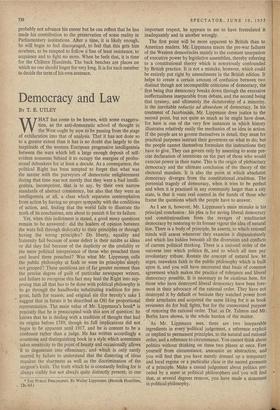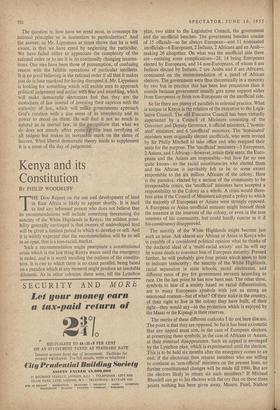Democracy and Law
By T. E. UTLEY WHAT has come to be known, with some exaggera- tion, as the anti-democratic school of thought in the West ought by now to be passing from the stage of exhilaration into that of analysis. That it has not done so to a greater extent than it has is no doubt due largely to the ineptitude of the western European progressive intelligentsia between the wars which left a large enough deposit of self- evident nonsense behind it to occupy the energies of profes- sional debunkers for at least a decade. As a consequence, the political Right has been tempted to forget that what was the matter with the purveyors of democratic enlightenment during that time was' not merely that they were a bad intelli- gentsia, incompetent, that is to say, by their own narrow standards of abstract consistency, but also that they were an intelligentsia at all, a class which separates contemplation from action by having no proper sympathy with the conditions of action, and, finding that the world fails to illustrate the truth of its conclusions, sets about to punish it for its failure.
Yet, when this indictment is stated, a good many questions remain to be answered : did the leaders of opinion between the wars fail through disloyalty to their principles or through having the wrong principles? Do liberty, equality and fraternity fail because of some defect in their nature as ideas or did they fail because of the duplicity or the credulity or the mere political inexperience of those who preached them and heard them preached? Was what Mr. Lippmann calls the public philosophy at fault or were its principles simply not grasped? These questions are of far greater moment than the precise degree of guilt of particular newspaper writers, and failure to recognise this fact may lead the Right into sup- posing that all that has to be done with political philosophy is to go through the handbooks substituting tradition for pro- gress, faith for reason, and original sin (for brevity's sake I - suggest that in future it be described as OS) for proportional representation. The main value of Mr. Lippmann's book* is precisely that he is preoccupied with this sort of question; he knows that he is dealing with a tradition of thought that had its origins before 1789, though its full implications did not begin to be apparent until 1917, and he is content to be a confessor rather than a judge. He has written accordingly a courteous and distinguishing book in a style which sometimes takes sensitivity to the point of beauty and occasionally allows it to degenerate into effeminacy, and which is only rarely marred by failure to understand that the dissecting of ideas requires the sharpness as well as the discrimination of the surgeon's knife. The truth which he is constantly feeling for is always visibly but not always quite distinctly present; in one * TUB PUBLIC PHILOSOPHY. By Walter Lippmann, (Hamish Hamilton, 12s.6(1.) important respect, he appears to me to have formulated it inadequately and in another wrongly.
The first point will be more apparent to British than to American readers. Mr. Lippmann traces the pre-war failures of the Western democracies mainly to the constant usurpation of executive power by legislative assemblies, thereby referring to a constitutional theory which is notoriously confounded by British practice. It is not a mistake, however, which could be entirely put right by amendments in the British edition. It helps to create a certain amount of confusion between two distinct though not incompatible criticisms of democracy, the first being that democracy breaks down through the executive ineffectualness inseparable from debate, and the second being that tyranny, and ultimately the dictatorship of a minority. is the inevitable reductio ad absurdum of democracy. In his treatment of Jacobinism, Mr. Lippmann does justice to the second point, but not quite so much as he might have done, for here is one of the very few instances in which history illustrates relatively easily the mechanics of an idea in action. If the people are to govern themselves in detail, they must for practical purposes instruct their governors on what to do; but the people cannot themselves formulate the instructions they have to give. They can govern only by assenting to some pre- cise declaration of intentions on the part of those who would exercise power in their name. This is the origin of plebiscitary democracy and the ultimate conclusion of the theory of the electoral mandate. It is also the point at which absolutist democracy diverges from the constitutional .tradition. The perennial tragedy of democracy, when it tries to be perfect and when it is practised in any community larger than a city state, is that it vests real control in the hands of those who frame the questions which the people have to answer.
As I see it, however, Mr. Lippmann's main mistake is his principal conclusion : his plea is for saving liberal democracy and constitutionalism from the ravages of totalitarian democracy by restoring to its former vigour the idea of natural law. There is a body of principle, he asserts, to which rational minds will assent whenever they examine it dispassionately and which lies hidden beneath all the diversities and conflicts of current political thinking. There is a rational order of the universe into which politics fit, and to which all men pay involuntary tribute. Restate the concept of natural law, he urges, reawaken faith in the public philosophy which is built upon it, and you will have uncovered that basis of common agreement which makes the practice of tolerpncc and liberal democracy possible. It is necessary to be cautious here, for those who have destroyed liberal democracy have bepn fore- most in their advocacy of the rational order. They have not destroyed it by default or becauke they watched power from their armchairs and acquired the same liking for it as book reviewers do for bull fights, but for the consecrated purpose of restoring the rational order. That. as Dr. Talmon and Mr. Berlin have shown, is the whole burden of the matter.
As Mr. Lippmann sees, there are two inseparable ingredients in every political judgement, a reference explicit or implied to permanent principles, to the natural and rational order, and a reference to circumstance. You cannot think about politics without thinking on these two planes at once. Free • yourself from circumstance, announce an abstraction, and you will find that you have merely dressed up a temporary and local regime or a particular class in the sacred garments of a principle. Make a casual judgement about politics pre- ceded by a sneer at political philosophers and you will find that, at several degrees remove, you have made a statement in political philosophy. The question is, how have we erred most, in contempt for rational principles or in inattention to particularities? And the answer, as Mr. Lippmann at times shows that he is well aware, is that we ,have erred by neglecting the particular. We have failed either to appreciate the complexity of the rational order or to See it in its continually changing incarna- tions. Our sins have been those of presumption, of confusing reason with the fallible operations of particular intellects. It i,s no good believing in the rational order if all that it makes you do is hate mankind for having disrupted it. Mr. Lippmann is looking for something which will enable men to approach political judgementand action with fear and trembling, which will make democratic electorates feel that they are the ustodians of law instead of investing their caprices with the authority of law, which will make governments approach God's creation with a due sense of its complexity and its power to recoil on them. He will find it not so much in natural as in eternal law, in the ecognition that what we do does not merely affect posterift (the least terrifying of all judges) but makes its inerasable mark on the slates of heaven. What liberal democratic theory needs to supplement it is a sense of the day of judgement.











































 Previous page
Previous page